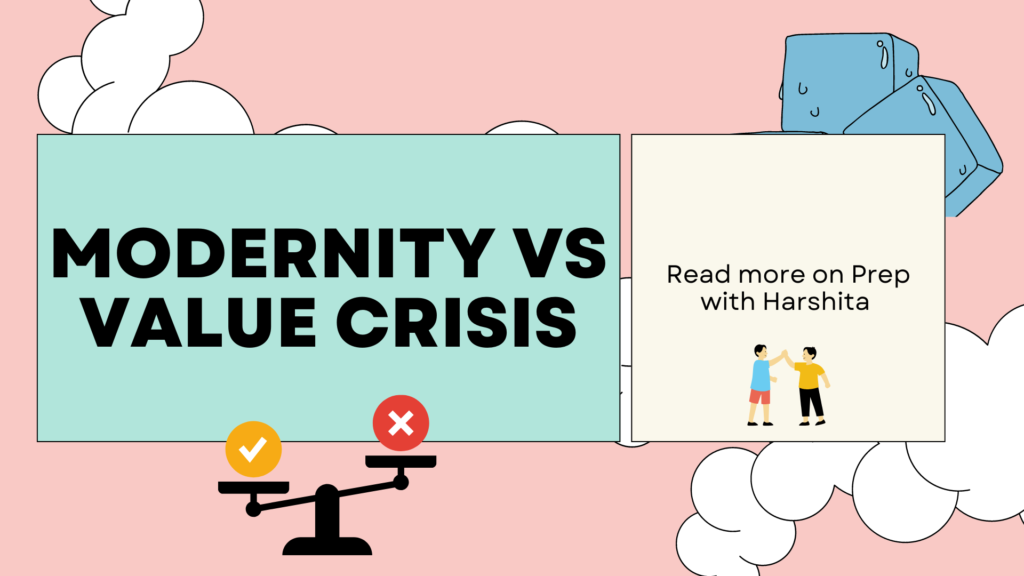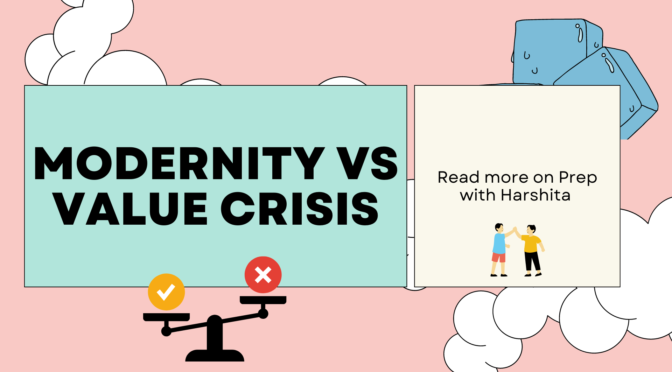Modernity and value crisis are two complex and interrelated concepts that are often discussed in sociology and philosophy. The relationship between them can be traced back to the Enlightenment period of the 18th century, which marked the beginning of modernity.
Modernity vs Value Crisis
Modernity is characterized by the pursuit of reason, science, individualism, and progress. It brought about significant changes in social, political, and economic systems, leading to a shift away from traditional ways of life. The rise of modernity was accompanied by a belief in progress, the idea that society could continuously improve through technological advancements, social reforms, and scientific discoveries.
Value Crisis
However, the rapid pace of social and cultural change that has accompanied modernity has led to a value crisis. This refers to a situation where individuals and societies experience a decline in shared values, ethics, and morality. As traditional social structures and values have been undermined, individuals have been left to navigate a complex and changing world without clear guidance or support. This has led to a sense of moral confusion and a decline in shared values, as individuals struggle to reconcile their traditional values with the demands of modern life.
Various Cause of Value Crisis
One of the main causes of value crisis is the erosion of traditional values and social structures. As societies have become more individualistic, and traditional institutions such as religion and family have declined in influence, individuals have been left to develop their own moral frameworks. This can lead to a sense of moral relativism, where individuals believe that there are no objective moral truths, and that morality is subjective and relative.
The rise of technology and globalization has also contributed to the value crisis. As societies become more interconnected and cultures mix, there is a greater diversity of values and beliefs, which can lead to a sense of moral relativism and a decline in shared values.
Value education can play an important role in addressing the challenges of modernity and value crisis. By instilling positive values and character traits in individuals, value education can help individuals to navigate the complex ethical and moral issues that arise in a rapidly changing world. It can also promote social cohesion and a sense of community, by instilling values of respect, tolerance, and empathy.
In summary, modernity and value crisis are two complex and interrelated concepts. The rapid pace of change that has accompanied modernity has led to a decline in shared values and a sense of moral confusion. This can be addressed through value education, which can help individuals to develop positive values and character traits and promote social cohesion.
Issues and Challenges related to Modernity and Value Crisis
Modernity and value crisis are complex concepts that have given rise to numerous issues and challenges.
Here are some of the key issues and challenges associated with these concepts:
- Moral relativism: One of the main challenges associated with value crisis is moral relativism. This is the belief that there are no objective moral truths, and that morality is subjective and relative. This can lead to a decline in shared values and a sense of moral confusion, as individuals struggle to navigate a complex and changing world without clear guidance or support.
- Erosion of traditional values and social structures: The erosion of traditional values and social structures is another challenge associated with value crisis. As societies have become more individualistic, and traditional institutions such as religion and family have declined in influence, individuals have been left to develop their own moral frameworks. This can lead to a sense of moral relativism and a decline in shared values.
- The rise of technology and globalization: Technology and globalization have also contributed to the value crisis. As societies become more interconnected and cultures mix, there is a greater diversity of values and beliefs, which can lead to a sense of moral relativism and a decline in shared values.
- Loss of social cohesion: The decline in shared values can also lead to a loss of social cohesion. Without shared values and a sense of community, individuals may feel isolated and disconnected from society, leading to a breakdown in social cohesion and a rise in social problems such as crime and drug abuse.
- Lack of ethical leadership: Another issue associated with value crisis is the lack of ethical leadership. In a society where values are eroding, it is important for leaders to provide clear guidance and promote positive values. However, in many cases, leaders may prioritize personal gain over the greater good, leading to a decline in ethical leadership and a further erosion of values.
- Cultural clashes: The diversity of values and beliefs in modern society can also lead to cultural clashes. When individuals from different cultures come into contact, there may be disagreements over values and beliefs, leading to tension and conflict.
Also Visit : Prep with Harshita

Also Read : Aims and Objectives of Value Education


Balanceadora
Sistemas de ajuste: esencial para el operacion fluido y productivo de las maquinarias.
En el campo de la avances moderna, donde la rendimiento y la seguridad del dispositivo son de gran relevancia, los dispositivos de balanceo cumplen un funcion fundamental. Estos sistemas especializados estan disenados para equilibrar y fijar partes dinamicas, ya sea en herramientas productiva, automoviles de transporte o incluso en aparatos caseros.
Para los profesionales en soporte de aparatos y los profesionales, operar con sistemas de calibracion es esencial para proteger el desempeno fluido y seguro de cualquier dispositivo dinamico. Gracias a estas herramientas avanzadas modernas, es posible minimizar notablemente las sacudidas, el ruido y la esfuerzo sobre los sujeciones, prolongando la duracion de elementos importantes.
Asimismo importante es el papel que juegan los sistemas de equilibrado en la asistencia al comprador. El apoyo tecnico y el soporte constante aplicando estos equipos posibilitan proporcionar soluciones de alta estandar, mejorando la contento de los clientes.
Para los propietarios de emprendimientos, la financiamiento en unidades de balanceo y sensores puede ser importante para aumentar la eficiencia y desempeno de sus dispositivos. Esto es principalmente significativo para los emprendedores que gestionan pequenas y modestas emprendimientos, donde cada elemento cuenta.
Asimismo, los dispositivos de balanceo tienen una gran uso en el sector de la seguridad y el monitoreo de estandar. Habilitan encontrar eventuales defectos, impidiendo intervenciones elevadas y perjuicios a los sistemas. Incluso, los indicadores extraidos de estos sistemas pueden emplearse para optimizar sistemas y mejorar la presencia en buscadores de consulta.
Las campos de aplicacion de los equipos de balanceo incluyen numerosas areas, desde la manufactura de transporte personal hasta el control ecologico. No afecta si se considera de importantes elaboraciones industriales o modestos locales de uso personal, los dispositivos de calibracion son indispensables para asegurar un desempeno eficiente y sin interrupciones.